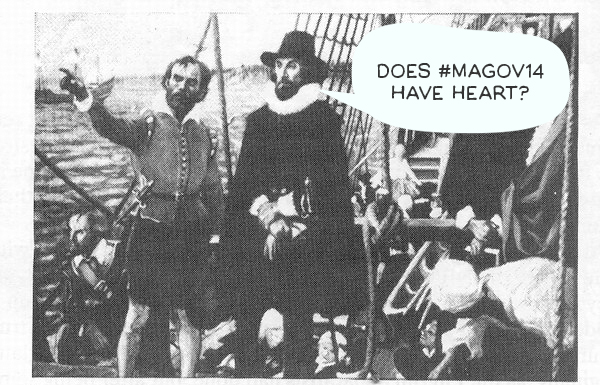
As Charlie Baker defends himself against charges of a “compassion deficit,” it is worthwhile to reflect what compassion is and where it comes from.
In a recent Boston Globe column Joan Vennochi recounted how Baker had remarked that “I don’t think I have a compassion deficit,” at a pre-primary visit to the Globe. What is actually at issue is, as Vennochi writes, “about how far he thinks government should go to solve problems for all the [disadvantaged] of the world — and how much taxpayers should spend on them here in Massachusetts.”
The roots of Massachusetts’ earned reputation for care of the vulnerable aren’t in government though, but in religion – and especially in the biblical understandings bequeathed by John Winthrop and our earliest settlers.
In “The Model of Christian Charity,” delivered on the Arbella in 1630, Winthrop preached to his fellows Puritans that must all be as one in the body of Christ. Man is
commanded to love his neighbor as himself. . . . First, that every man afford his help to another in every want or distress. . . .
Secondly, that he performs this out of the same affection which makes him careful of his own goods, according to the words of our Savior (from Matthew 7:12), whatsoever ye would that men should do to you.
Thirdly, . . . Love your enemies… Do good to them that hate you. …
If thy brother be in want and thou canst help him, thou needs not make doubt of what thou shouldst do; if thou lovest God thou must help him.
Amidst all these “thou”s and “shouldst”s we might acknowledge that this is a rather ancient form of practice to bind we moderns, but as Professor Irving Bartlett constantly reminded me, culture is tenacious. Care for the poor and vulnerable is embedded in the Massachusetts DNA.
As Brandeis historian David Hackett Fischer wrote in Albion’s Seed, the religious beliefs of the Puritans did structure (however imperfectly and evolving) a rather generous support system for community members who were in straitened circumstances. Towns were required by law to care for their poor – Fischer even sees Puritan care for the vulnerable as foreshadowing Franklin Delano Roosevelt’s “freedom from want” as one of the Four Freedoms. One consequence of this generosity was that even in Puritan times Massachusetts taxed its residents heavily relative to other settlements.
On the other hand the Puritans had a circumscribed notion of who was deserving of support from the community. While community members were cared for, vagrant poor were treated brutally. As always, whether vagrant poor or immigrant children from Central America, who is deserving of care from a political community is contentious.
A religious outlook that excludes non-believers is obviously unsuitable in modern times and though many denominations perform works of charity our modern vehicle for “compassion” is the state. Liberals for the most part wholeheartedly rely upon the state to command the field of compassion. Conservatives may be as compassionate as anyone else toward those in need but being suspicious of government find it a less reliable vehicle for good works.
Governor Deval Patrick is our modern Puritan. In Deval Patrick’s “City Upon a Hill” he reaffirmed the “Model of Christian Charity” when he stood with ministers of different faiths in declaring that Massachusetts would welcome immigrant children. In his Democratic Party state convention speech of 2012 the Puritan Conservative governor related the story of the Orchard’s Garden School, an improving school that was once one of the worst in the state. “But those Orchard’s Garden kids should not be left on their own. Those children are our children; America’s children. Yours and mine too…. For this country to rise, they must rise; they must rise. And we have a common stake in that.”
Yet “Even so faith, if it hath not works, is dead, being alone.” James 2:17.
If the Department of Children and Families loses track of vulnerable children under its protection, or Bridgewater State Hospital treats its patients inhumanely, then compassion is but a word.
Can the state be compassionate? We have no other realistic way to care for the poor among us, though the state’s motivations cannot replicate those of our state’s earliest settlers. In our times we can scarcely expect a society in which, as Winthrop stated, “the care of the public must oversway all private respects, by which, not only in conscience, but mere civil policy, doth bind us. For it is a true rule that particular estates cannot subsist in the ruin of the public.”

